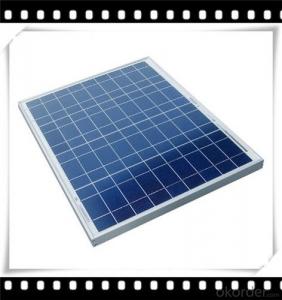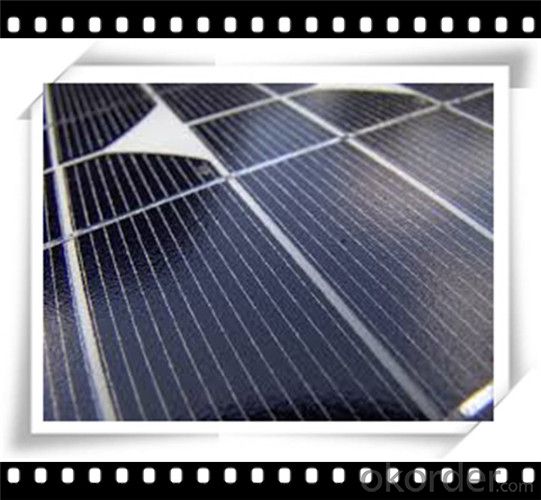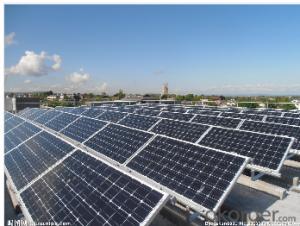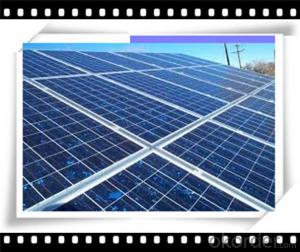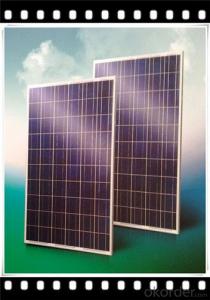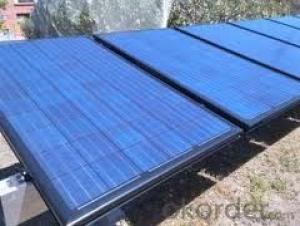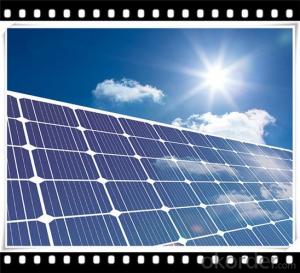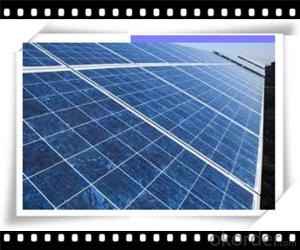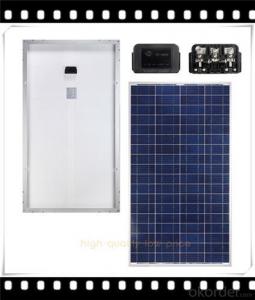Tindo Solar Panels 75w Poly Mini Newest Solar Panel CNBM
- Loading Port:
- Qingdao
- Payment Terms:
- TT OR LC
- Min Order Qty:
- 10 set
- Supply Capability:
- 300000 set/month
OKorder Service Pledge
OKorder Financial Service
You Might Also Like
Polycrystalline Solar Modules
CNBM offers a range of small, medium and large polycrystalline solar modules, designed for a range of requirements.
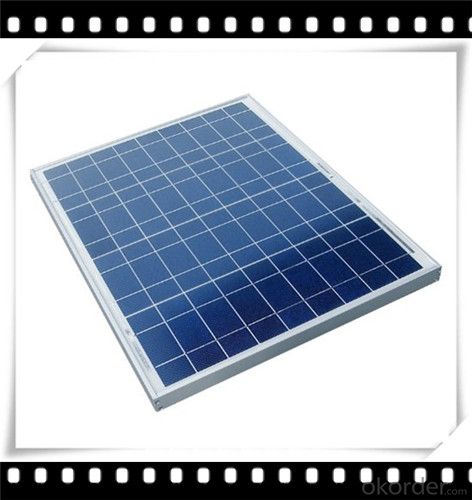
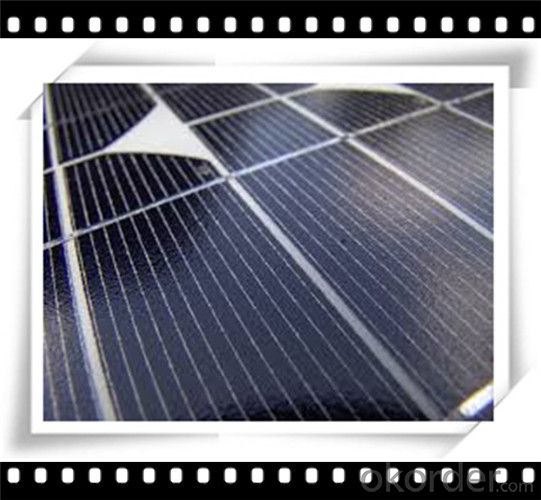
Specifications:
+/-3% |
Polycrystalline silicon solar cells (156 x 156mm) |
60 (10 x 6) |
1650 x 990 x 40 |
25.5 |
Limits:
Operating Temperature | -40~+85? |
Storage Temperature | -40~+85? |
Maximum System Voltage | 1000 VDC max. |
Hail Impact | Diameter of 28mm with impact speed |
Temperature and Coefficients:
NOCT | 48C+/-2? |
Voltage temperature coefficient (%/K) | -0.35 |
Current temperature coefficient (%/K) | 0.05 |
Power temperature coefficient (%/K) | -0.45 |
Characteristics:
Model: | SGM-200P | SGM-210P | SGM-220P |
Max-power voltage Vmp (V) | 29.2 | 29.4 | 29.41 |
Max-power current Imp (A) | 6.85 | 7.14 | 7.48 |
Open-circuit voltage Voc (V) | 36.5 | 36.69 | 36.9 |
Short-Circuit Current Isc (A) | 7.28 | 7.6 | 7.93 |
Max-power Pm(W) | 200 | 210 | 220 |
Model: | SGM-230P |
Max-power voltage Vmp (V) | 29.8 |
Max-power current Imp (A) | 7.72 |
Open-circuit voltage Voc (V) | 37.31 |
Short-Circuit Current Isc (A) | 8.19 |
Max-power Pm(W) | 230 |
STC: Irradiance 1000W/m2, module temperature 25?, AM-=1.5
Poly Crystalline Solar Panels Specifications Range
Maximum Power (Pm) | Dimension | Weight | Operating Voltage (Vmp) | Operating Current (Imp) | Open Circuit Voltage (Voc) | Short Circuit Current (Isc) |
0.45W | 140x80x10mm | 0.08kg | 3.3V | 150mA | 4.6V | 160mA |
1.0W | 162x140x10mm | 0.16kg | 7.5V | 150mA | 10.3V | 160mA |
4.5W | 269x251x23mm | 0.8kg | 16.5V | 0.27A | 20.5V | 0.3A |
10W | 420.1×268.9×22.6mm | 1.92kg | 17.5V | 0.58A | 20.5V | 0.6A |
20W | 425x502x50mm | 3.0kg | 16.8V | 1.19A | 21.0V | 1.29A |
30W | 593x502x22.6mm | 3.9kg | 16.8V | 1.78A | 21.0V | 1.94A |
40W | 655x537x50mm | 5.75kg | 17.3V | 2.31A | 22.1V | 2.54A |
50W | 839x537x50mm | 6.0kg | 17.5V | 2.9A | 21.8V | 3.17A |
65W | 1111x502x50mm | 7.2kg | 17.6V | 3.69A | 22.1V | 3.99A |
80W | 1204x537x50mm | 7.7kg | 17.6V | 4.55A | 22.1V | 4.8A |
- Q: Are there any health risks associated with solar panels?
- There are no direct health risks associated with solar panels. However, improper installation or maintenance may pose electrical hazards, and exposure to high temperatures or falling from heights during installation can lead to accidents. Additionally, some solar panels contain small amounts of hazardous materials, but they are tightly sealed and the risk of exposure is minimal. Overall, when installed and maintained correctly, solar panels are safe and have numerous environmental and health benefits.
- Q: Do solar panels require regular inspections or maintenance checks?
- Yes, solar panels do require regular inspections and maintenance checks to ensure optimal performance and longevity. These inspections typically involve checking for any potential damage, dirt or debris accumulation, and monitoring the efficiency of the system. Regular maintenance checks may include cleaning the panels, inspecting wiring and connections, and testing the functionality of inverters and other components. By conducting these inspections and maintenance checks, any issues can be identified and resolved promptly, maximizing the efficiency and lifespan of the solar panel system.
- Q: Can solar panels be used in disaster relief efforts?
- Yes, solar panels can be used in disaster relief efforts. They provide a reliable and sustainable source of electricity, allowing for the operation of critical equipment such as lights, phones, and medical devices. Solar panels can be quickly deployed in affected areas and can help reduce the reliance on fossil fuel-based generators, thereby reducing pollution and the need for fuel transportation.
- Q: Can solar panels be used in areas with high levels of pollution from industrial activities?
- Yes, solar panels can be used in areas with high levels of pollution from industrial activities. While pollution may have some impact on the efficiency and performance of solar panels, they can still generate electricity even in polluted areas. It's important to regularly clean the panels to maintain their optimal efficiency and ensure maximum energy production. Additionally, investing in advanced technologies and air pollution control measures can help mitigate the effects of pollution and improve the overall effectiveness of solar panels in such areas.
- Q: Someone Said It costed them 50,000 To Install Solar Panel In their House and 35,000 For Installation. Is that true?
- It costs more than they will ever save you in electricity cost.
- Q: Can solar panels be used to power a mining operation?
- Yes, solar panels can be used to power a mining operation. Solar energy can be harnessed and converted into electricity to meet the power needs of a mining operation. By installing a solar panel system, mining companies can reduce their reliance on fossil fuels, lower energy costs, and minimize their carbon footprint. However, the feasibility of using solar panels for mining operations would depend on various factors such as the energy requirements of the mine, available sunlight, and the size of the solar panel system needed to generate sufficient power.
- Q: Can solar panels be used to power a shopping mall?
- Yes, solar panels can be used to power a shopping mall. By installing a sufficient number of solar panels on the roof or surrounding areas of the mall, it is possible to generate enough electricity to meet a significant portion, if not all, of its power needs. This renewable energy source can reduce the mall's reliance on traditional electricity sources and contribute to a more sustainable and environmentally friendly operation.
- Q: Do solar panels require a battery for energy storage?
- No, solar panels do not require a battery for energy storage. However, if you want to store the excess energy generated by the panels for use during non-sunny periods or at night, a battery storage system can be installed.
- Q: Can solar panels work during cloudy or rainy days?
- Yes, solar panels can still generate electricity during cloudy or rainy days, although their efficiency may be reduced. While direct sunlight is optimal for maximum power output, solar panels can still capture diffuse sunlight and convert it into usable energy.
Send your message to us
Tindo Solar Panels 75w Poly Mini Newest Solar Panel CNBM
- Loading Port:
- Qingdao
- Payment Terms:
- TT OR LC
- Min Order Qty:
- 10 set
- Supply Capability:
- 300000 set/month
OKorder Service Pledge
OKorder Financial Service
Similar products
Hot products
Hot Searches
Related keywords
